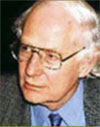Major talk given by one of the world's leading NDE researchers summarizing 30 years of research - a fundamental overview of scientific findings.
Science and Spirituality: A Challenge for the 21st Century
The Bruce Greyson Lecture from the International Association for Near-Death Studies 2004 Annual Conference
Peter Fenwick, M.D., F.R.C.Psych.
Institute of Psychiatry, Kings College, London, U.K.
Mental Health Group, University of Southampton, U.K.
 Peter Fenwick, M.D., F.R.C.Psych., is Senior Lecturer at the Institute of Psychiatry, Kings College, London, and associated with the Mental Health Group at the University of Southampton. He is also Consultant Neuropsychiatrist at the Maudsley Hospital and at the John Radcliffe Hospital in Oxford, and holds a visiting professorship in Japan, where he spends three months of the year in advanced neuropsychiatric research. Reprint requests should be addressed to Dr. Fenwick at the Institute for Psychiatry, deCrespigny Park Road, London S.E.5, United Kingdom.
Peter Fenwick, M.D., F.R.C.Psych., is Senior Lecturer at the Institute of Psychiatry, Kings College, London, and associated with the Mental Health Group at the University of Southampton. He is also Consultant Neuropsychiatrist at the Maudsley Hospital and at the John Radcliffe Hospital in Oxford, and holds a visiting professorship in Japan, where he spends three months of the year in advanced neuropsychiatric research. Reprint requests should be addressed to Dr. Fenwick at the Institute for Psychiatry, deCrespigny Park Road, London S.E.5, United Kingdom.
This paper was transcribed and edited from Dr. Fenwick’s Bruce Greyson Lecture at the 2004 annual conference of the International Association for Near-Death Studies by Janice Miner Holden, Ed.D., Professor in, and Coordinator of, the counseling program at the University of North Texas in Denton. Dr. Holden’s primary area of research interest is the transpersonal perspective in counseling, in general, and near-death and similar experiences – their veridicality and their role in personal and transpersonal development – in particular. She currently serves as president of the International Association for Near-Death Studies.
A major and relatively rapid shift is underway in the field of medicine. In the past 10 years, medical professionals have gone from looking upon spirituality with a skeptical if not cynical eye, to embracing it enthusiastically. Consider these developments:
- The number of American medical schools teaching courses on spirituality in medicine was only three in 1995, but grew to 40 by 1998, and reached 100 in 2001. The new generation of doctors that are now qualifying has had spirituality ingrained at an early stage in their medical training.
- In 1997, Harvard University held a conference on prayer. Since then, researchers have conducted a number of double blind, randomized, controlled trials on prayer, and some of these studies indicated that prayer works. The role of prayer in medicine is beginning to be taken so seriously that, in a recent issue of one of the major journals of cardiology, an author raised the question of whether every hospital in this country and in the United Kingdom should have prayer groups for patients in hospital. Such a suggestion would have been unthinkable 10 years ago.
- In 1999, the British Psychological Society, the main academic psychological institution in the U.K., started a section on transpersonal (spiritual) psychology. And in the year 2000, a number of us were able to persuade the Royal College of Psychiatrists to bring in a special interest group in spiritual psychiatry. That group has been growing the fastest of any special interest group: 800 psychiatrists in the U.K. have joined the section in less than four years.
- In 2000, Oxford University Press published the Handbook of Religion and Health. In it, authors Harold Koenig, Michael McCullough, and David Larson have brought together into one volume all the research on spiritual medicine. All of you who are caregivers or doctors should have it on your shelf, or urge your libraries to acquire it.
- And to make a point that I have already mentioned, double blind, randomized, controlled trials on many aspects of spiritual medicine are now being conducted. The role of spirituality in medicine has become a legitimate and frequent subject of empirical research. A book by Daniel Benor, Spiritual Healing: Scientific Validation of a Healing Revolution. Professional Supplement (Vision Publications 2002) is an excellent reference volume.
Things have changed for the better regarding serious inquiry into, and acceptance of, the role of spirituality in medicine. But they still have further to go. Today I would like to talk about two sets of experiences: approaching-death experiences that occur in the 24 hours before death, and the dying process itself, for which I am going to use the near-death experience (NDE) as a model. I am going to begin my talk with near-death experiences. First, I will discuss the early retrospective studies, those that involved researchers collecting accounts from experiencers whom they met for the first time after the participants had already had their NDEs, and about whom they had no information. I will address only those aspects of these studies that particularly interest me. Then, I will talk about the current focus of near-death research: prospective studies, those in which the researcher begins studying the participants before they have their NDEs, and thus has information about the circumstances in which the near-death experience occurs.

